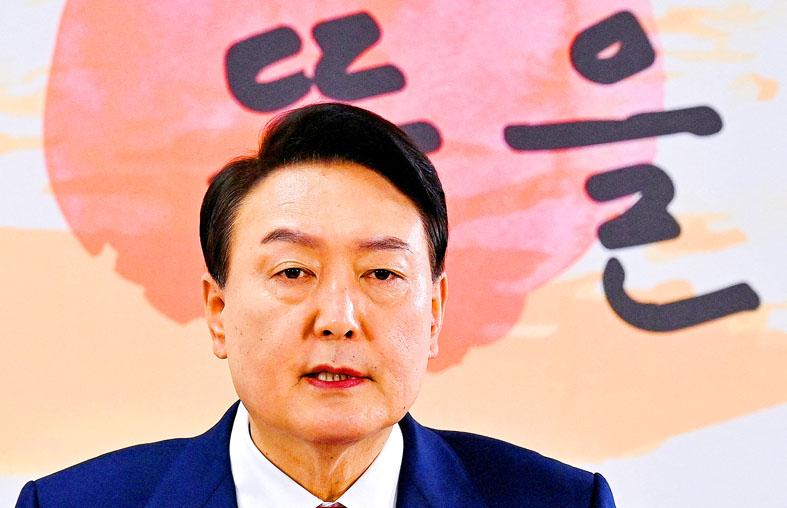South Korean president-elect Yoon Suk-yeol yesterday named Choo Kyung-ho to be deputy prime minister and finance minister, as the country seeks to tackle surging inflation, household debt and demand for welfare.
Yoon, who takes office on May 10, announced eight Cabinet minister nominations, including defense, industry, health and land. All are subject to parliamentary confirmation hearings.
As deputy prime minister, Choo, 62, would double as finance minister and oversee economic policy, replacing Hong Nam-ki.

Photo: Reuters
Choo is a second-term lawmaker in Yoon’s conservative People Power Party. He served 33 years in government roles including vice minister of economy and finance, and vice chairman of the Financial Services Commission.
His nomination came as Asia’s fourth-largest economy faces challenges of quelling decade-high inflation without destabilizing markets as recovery from the COVID-19 pandemic continues.
Standing with Choo, Yoon said the nominee would facilitate policy coordination among agencies and with the parliament.
“The current economic situation are extremely serious, and internal and external circumstances are tough,” Choo told a news conference, citing inflation and slowing growth. “The new government’s top priority is to stabilize prices and people’s livelihoods.”
South Korea’s economy last year grew 4 percent, highest in 11 years, but is expected to slow down this year and consumer inflation is at a decade-high of 4.1 percent amid global supply shocks and disruptions caused by Russia’s invasion of Ukraine.
As a member of the presidential transition committee, Choo has been working to draw up an extra budget plan to support small businesses and self-employed people who have been affected by COVID-19.
Yoon nominated Lee Jong-sup, a retired military commander who formerly served as deputy chairman of the Joint Chiefs of Staff, to be defense minister.
The incoming president is mapping out his foreign policy agenda just as tension flares after North Korea launched a new intercontinental ballistic missile last month.
Lee said he would bolster Seoul’s independent response capability and “maximize US deterrence” to counter the North’s threats.
A team of Yoon’s foreign policy and security advisers last week said that they discussed redeploying US strategic assets, such as nuclear bombers and submarines, to South Korea during talks with Washington officials.

Young women standing idly around a park in Tokyo’s west suggest that a giant statue of Godzilla is not the only attraction for a record number of foreign tourists. Their faces lit by the cold glow of their phones, the women lining Okubo Park are evidence that sex tourism has developed as a dark flipside to the bustling Kabukicho nightlife district. Increasing numbers of foreign men are flocking to the area after seeing videos on social media. One of the women said that the area near Kabukicho, where Godzilla rumbles and belches smoke atop a cinema, has become a “real

Two Belgian teenagers on Tuesday were charged with wildlife piracy after they were found with thousands of ants packed in test tubes in what Kenyan authorities said was part of a trend in trafficking smaller and lesser-known species. Lornoy David and Seppe Lodewijckx, two 19-year-olds who were arrested on April 5 with 5,000 ants at a guest house, appeared distraught during their appearance before a magistrate in Nairobi and were comforted in the courtroom by relatives. They told the magistrate that they were collecting the ants for fun and did not know that it was illegal. In a separate criminal case, Kenyan Dennis

Incumbent Ecuadoran President Daniel Noboa on Sunday claimed a runaway victory in the nation’s presidential election, after voters endorsed the young leader’s “iron fist” approach to rampant cartel violence. With more than 90 percent of the votes counted, the National Election Council said Noboa had an unassailable 12-point lead over his leftist rival Luisa Gonzalez. Official results showed Noboa with 56 percent of the vote, against Gonzalez’s 44 percent — a far bigger winning margin than expected after a virtual tie in the first round. Speaking to jubilant supporters in his hometown of Olon, the 37-year-old president claimed a “historic victory.” “A huge hug

A judge in Bangladesh issued an arrest warrant for the British member of parliament and former British economic secretary to the treasury Tulip Siddiq, who is a niece of former Bangladeshi prime minister Sheikh Hasina, who was ousted in August last year in a mass uprising that ended her 15-year rule. The Bangladeshi Anti-Corruption Commission has been investigating allegations against Siddiq that she and her family members, including Hasina, illegally received land in a state-owned township project near Dhaka, the capital. Senior Special Judge of Dhaka Metropolitan Zakir Hossain passed the order on Sunday, after considering charges in three separate cases filed